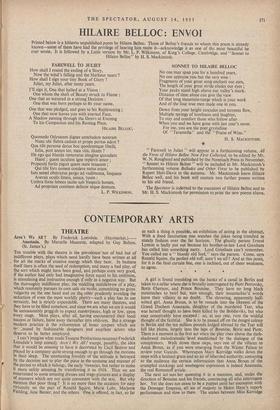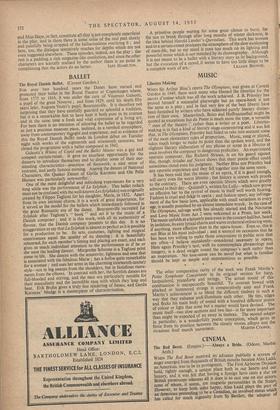CONTEMPORARY ARTS
THEATRE
Aren't We All ? By Frederick Lonsdale. (Haymarket.) Anastasia. By Marcelle Maurette, adapted by Guy Bolton. (St. James's.) THE trouble with the theatre is the prevalence'not of bad but of indifferent plays, plays which need hardly have been written at all for all the marks of creative energy which they bear. In badness itself there is often the seed of redemption, and many a bad play, of the sort which might have been good, and perhaps even very good, if the author had only had imaginative force equal to his ambition, is stimulating and instructive enough if only in a negative way. But the thoroughly indifferent play, the middling middlebrow of a play, which resolutely pursues its own safe via media, committing no gross vulgarity on the one hand and on thq other prudently avoiding the seduction of even the most worldly poetry—such a play has its use certainly, but is strictly expendable. There are many theatres, and they have to be filled somehow, and since we are what we are it would be unreasonably priggish to expect masterpieces, high or low, upon every stage. Most plays, after all, having encountered their local success or failure, haste away thereafter into oblivion. But a strange Modern practice is the exhumation of lesser corpses which are re,—Imated by fashionable designers and excellent actors who deserve to be better employed.
I can't imagine what made Tennent Productions resurrect Frederick Lonsdale's limp comedy Aren't We All? except, possibly, the idea that it would be amusing to have it decorated by Cecil Beaton-and Played by a company quite strong enough to go through the motions in their sleep. The unamusing frivolity of the attitude is betrayed by the decision not to play the piece in the costume and manner of the period to which it belongs, the early 'twenties, but rather to make it more safely amusing by transferring it to 1914. Thus we are entertained to some amusing dresses and stage-pictures and a display of manners which are not quite consonant with the text. But why mention that poor thing ? It is no more than the occasion for easy virtuosity on the part of Ronald Squire, Marie Lohr, Marjorie Fielding, Jane Baxter, and the others. One is offered, in fact, so far
as such a thing is possible, an exhibition of acting in the abstract. With a fixed fascination one watches the jokes being trundled in stately fashion over the far horizon. The ghastly parson Ernest Lynton is badly put out because his brother-in-law Lord Grenham has called him something nasty. Lord Gienham can't remember. You called me a " bloody old fool," says the parson. Come, says Ronald Squire, the perfect old toff, aren't we all ? And at this point, for it is the final curtain line, one is inclined, out of sheer weakness, to agree.
A girl is found trembling on the banks of a canal in Berlin and taken to a cellar where she is brutally interrogated by Piotr Petrovsky, Boris Chernov, and Prince Bounine. They have no long black moustaches to twirl but, sure enough, their moustachio'd words leave their villainy in no doubt. The shivering, apparently half- witted girl, Anna Broun, is to be remade into the likeness of the Grand Duchess Anastasia, daughter of the murdered Tsar, who was herself thought to have been killed by the Bolsheviks, but who may conceivably have escaped : so, at any rate, runs the wishful thought of the faithful. She is to be passed off on the émigré colony in Berlin and the ten million pounds lodged abroad by the Tsar will fall like plums, largely into the laps of Bounine, Boris and Piotr. There is a moment in the first act when the play rises above the dark- shadowed melodramatic level established by the dialogue of the conspirators. Walk down these steps, says one of the villains to Anna Broun, as if you were emerging from the Winter Palace to review your Guards. Whereupon Mary Kerridge walks down the steps with a hesitant grace and an air of inherited authority, conveying to the audience the certain information that Anna Broun of the crumpled stockings and woebegone expression is indeed Anastasia, the real Romanoff article. The next act sees her queening it in a mansion, and, under the direction of Bounine and his friends, convincing all who interrogate her. Yet she does not cease to be a puppet until her encounter with the Dowager Empress, all ice of majesty in Helen Haye's superb performance and slow to thaw. The scenes between Miss Kerridge and Miss Haye, in fact, constitute all that i§ not completely superficial in the play, and in them there is some sense of the real past slowly and painfully being stripped of the hallucinations overlying it ; and here, too, the dialogue tentatively reaches for depths which are not even suggested elsewhere. These episodes, indeed, are the play : the rest is a padding, a rich magazine-like confection, and since the other characters are scarcely realised by the author there is no point in complaining that the actors do no better. LAIN HAMILTON.



































 Previous page
Previous page